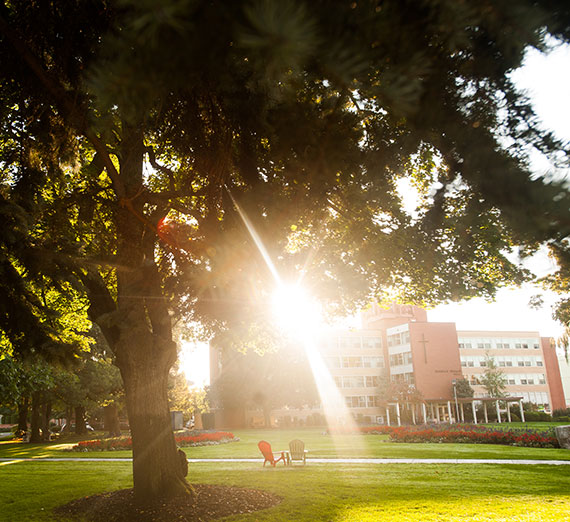Striving to Move from Burnout to Wellness

This post-COVID era has illuminated mental health issues and burnout among workers worldwide, and Gonzaga is no exception.
Wars, politics, inflation, gun violence all impact our daily lives. At Gonzaga, employee shortages, increased workloads, regular changes in leadership and unclear expectations are some of the causes leading to illness, depression, anxiety, exhaustion and other strains.
The University is looking burnout straight in the eye and addressing ways to alleviate or minimize the stress.
Faculty Issues and Opportunities
On the faculty side, Provost Sacha Kopp has made well-being a primary objective this academic year through his Provost Lecture Series. Nichole Barta in the Center for Teaching and Advising is running a series of workshops and seminars on countering burnout.
“The rapid integration of technology into the educational space has been a significant challenge for many faculty members,” Barta says. Learning platforms like Zoom and Canvas require time to understand and effectively integrate into teaching methods. The ongoing advancements in AI and its implications in the education sector further intensify the need for faculty to stay updated, often feeling they are in a perpetual state of catching up.
“Frequent changes in leadership positions such as provosts, deans and department chairs, can introduce new directives, expectations and priorities. Faculty may find themselves constantly adapting to these changes, leading to feelings of instability and unpredictability,” Barta says. “And the ambiguity surrounding RPT (Reappointment, Promotion and Tenure) processes is a significant source of anxiety for many faculty members.”
CTA is providing spaces for faculty to openly discuss their experiences. Book studies and collaborative discussions in the CTA/ Provost-sponsored events are ways GU is providing outlets for faculty. “Many faculty have expressed relief in discovering that others share similar sentiment,” says Barta. This shared understanding fosters a sense of camaraderie, reinforcing the idea that individuals are not isolated in their struggles.
Help for Staff
Staff have shared concerns about limited opportunities for growth at Gonzaga. The new Career Framework that Human Resources will soon unveil provides clarity and vision on how staff can build their career at Gonzaga, reminds Associate Vice President for HR Jamie Tancrell.
Supervisor training has put an emphasis on understanding signs of burnout and supporting employees in finding answers to their stresses.
In talks with staff supervisors this fall, Management Associate Professor Rebecca Bull Schaefer listed ways supervisors can help improve work situations for colleagues: Develop ways to improve jobs, improve work environments, check in on colleagues more often to show interest in them as people, offer flexibility and make them aware of wellness programs offered at the University.
“Don’t give them less to do but offer them more variety to better use their entire skill set and remind them how important they are to the mission of Gonzaga,” she says. Exercise, work-hour flexibility and providing needed resources can go a long way. Check out Gonzaga’s vast array of mental health resources at https://gonzaga.mysupportportal.com/.
Campus Wellness
Jennifer Fountain is Student Affairs’ new dean of well-being and flourishing. While students are a primary focus, she has tasked her team with developing a campuswide strategy for wellness.
“Research tells us that a large number of students expect faculty and staff to be concerned for them and have the resources available to care for their well-being,” Fountain says. “The missing piece is how we empower and embolden our faculty and staff to do just that. That is where I come in.”
She advised everyone in this campus community to lead with well-being. “Yes, we have budget issues and enrollment worries, but we cannot teach someone what we know until we teach them that we care. So, start every interaction by looking someone in the eye and take stock in how that person shows up,” Fountain advises. “Start every meeting with a prayer or a mindful activity that involves everyone.”
“Lead with care and others will share what they are struggling with. The time is right to show our care for one another,” Fountain says.
Rudolf Fitness Center Director José Hernandez has seen an increase in anxiety among students, faculty and staff, visible in how people treat each other and the equipment at the center.
“I am happy to create classes specific to departments or offices,” Hernandez says. “We have partnered with HR to create yoga classes and water aerobics for faculty and staff. We have also joined the Dance Department in classes to help people be more aware of balance and mindfulness to help them find more balance in their lives.
“We are willing to meet people where they are and help them develop ideas to improve well-being within their work groups,” says Hernandez, who encourages supervisors to send him an email.
